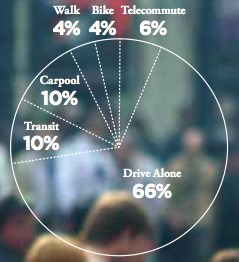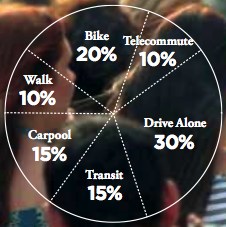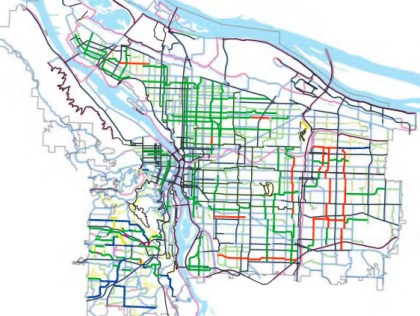
The City of Portland and Multnomah County will co-present their Climate Action Plan to citizens at a series of town halls beginning this Monday.
The plan is their “40 year roadmap for the institutional and individual change needed” to reach their ambitious climate protection goals. The over-arching goal is to reduce local carbon emissions by 80 percent by 2050.

To reach that goal, planning for more bicycle use will undoubtedly play a major role. In fact, bicycles are featured prominently in two of the 16 objectives listed in the plan. Here they are:
2030 Objective 4: Create vibrant neighborhoods where 90% of Portland residents and 80% of Multnomah County residents can easily walk or bicycle to meet all basic daily, non-work needs
This objective is similar to the “20 minute neighborhood” concept being thrown around in the Bureau of Planning’s Portland Plan (this city loves its plans). It also reminds me of the Bureau of Transportation’s 2029 bikeway network buildout plans. PBOT says it would cost $300 million to have a bike system where 95% of Portlanders would live within 5 blocks of a “family-friendly” bikeway.
2030 Objective 5: Reduce per capita daily vehicle miles traveled 50% from 2008 levels
In the Climate Action Plan, there’s a stated goal to reach a 20% bike commute mode share by 2030. That dovetails nicely with a commitment Mayor Adams made last month when he signed the Charter of Brussels — to get a 15% mode share by 2020.
Since about half of Portland’s motor vehicle trips are a nice biking distance (2-4 miles), all we’ve got to do is build a real, connected, efficient, and safe bike network and we should have all our VMT and mode share goals covered (easy, right?).
Within Objective 5, the Plan lists several “Actions to be completed by 2012”. Among them:
Identify the steps necessary to create a world-class bicycle system throughout Portland and Multnomah County.
Great. That’s already been done. PBOT has done all sorts of research to identify where to build new bikeways. And then there’s this part…
Fund the first tier of improvements identified in the City of Portland Bicycle Master Plan and adopt a schedule of funding to address subsequent improvements.
Darn…there’s that “fund” word again. That’s the hard part. Funding, especially for bikeways, is not easy to find these days. But there are bright spots. After PBOT Director Sue Keil pretty much left bicycles on the side of the road in her proposed budget, Mayor Adams stepped up with his budget and found a few solid ways (thanks to stimulus money) to pay for at least a “down payment” on a real bike network ($500,000 a year so far, carved out of a utility franchise fee).

But to fund a bike network that will take a big chunk out of our VMT numbers and increase our bike mode split to 20%, we’ll need a lot more than a down payment. To raise some real cash, I would love to see Adams or Metro put forward a bond measure that lets Portlanders vote to tax ourselves to pay for non-motorized transportation infrastructure (I bet it would pass).
In fact, at a recent round of open houses for the Bicycle Master Plan Update, PBOT surveyed attendees to find out if they’d pay $1.50 a month to raise $10 million a year for “high priority bike improvements” over the next 15 years. Nearly everyone responded with either “strongly agree” or “agree”.
Combine a strong vote of confidence on the goals stated in this Climate Action Plan with a strong Bike Master Plan, a PBOT budget (that included increased bike funding) that sailed through Council, and a growing amount of support and momentum around biking in this city, and I can see some real initiatives on the horizon.
Bottom line is that bikes are the closest thing we’ve got a silver bullet. They can help us create a much healthier city, economy, population, and environment, all at once.
Make it out to a Climate Action Plan Town Hall in your neighborhood and make sure Mayor Adams and County Chair Ted Wheeler get that message:
-
Downtown – Business Focused
Monday, June 15
5:30 – 7:30 pm
SOUK, 322 NW 6th Ave
Southeast
Saturday, June 20
1:00 – 3:00 pm
Mt Scott Community Center, 5530 SE 72nd Ave
Southwest
Monday, June 22
6:30 – 8:30 pm
Fulton Park Community Center, 68 SW Miles St
Northeast
Thursday, June 25
6:30 – 8:30 pm
Dishman Community Center, 77 NE Knott
Downtown/Central Westside
Monday, June 29
6:30 – 8:30 pm
Lincoln High School Cafeteria
1600 SW Salmon St
North
Tuesday, July 7
6:30 – 8:30 pm
University Park Community Center, 9009 N Foss Ave

